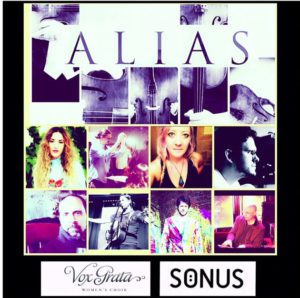Novel Noise: A Celebration of Tennessee
On Sunday, February 24, the Alias Ensemble performed the final concert of its three-part “Novel Noise” series. The series aims to provide the listener “unique and unusual sounds” and seems to want the audience to question the distinction of classical music as a genre and its relation to other types of musics. Keeping with the “unique” theme, in the strictest sense possible, the program offered eight world premieres for composers, mostly, working in or around the Nashville area.
 The first piece of the night was from one of the composers on the program who is not currently working in the Nashville area. Dabney Morris is currently working out of Los Angeles and has an impressive resume including many arrangements and, most notably, presence on the score of the upcoming Netflix film, All the Bright Places. Morris’s contribution to the night was a piece entitled Burnt Norton, named after the first poem in T.S. Eliot’s Four Quartets. The piece’s instrumentation is not, as you might suspect, a quartet, but rather an octet consisting of a string quintet and a woodwind trio.
The first piece of the night was from one of the composers on the program who is not currently working in the Nashville area. Dabney Morris is currently working out of Los Angeles and has an impressive resume including many arrangements and, most notably, presence on the score of the upcoming Netflix film, All the Bright Places. Morris’s contribution to the night was a piece entitled Burnt Norton, named after the first poem in T.S. Eliot’s Four Quartets. The piece’s instrumentation is not, as you might suspect, a quartet, but rather an octet consisting of a string quintet and a woodwind trio.
The piece itself seems to take inspiration from the slow pace, non-confrontational tone, and meditative nature of Eliot’s poetry. The piece seems to wander through sections, happening upon small themes along the way, seemingly meant to be more immersive than formulated. It offers a nice experience of pleasant tone combinations, thanks to the instrumentation, and interesting harmonies.
The second piece was by Peter Bradley Adams, a composer and singer-songwriter based out of Brooklyn, NY currently. His Little Flower is a piece for string quartet, two guitars, and two vocalists in octaves rather than other harmonies, at least throughout most of the piece. The piece opened with an introduction from the strings that sounded right off of the latest country single, with static harmonies and an emphasis on that stasis. The group is then joined by the guitars and the vocalists continuing this juxtaposition of the two genres. The piece continues with its three verses and then concluded with a return to the harmonic stasis of the string quartet.
Third in the program was Bruce Dudley’s Between Light and Dark. Dudley is a professor at Belmont University in Nashville and has numerous composing and performing credits to his name. The piece is written for a cello quartet and piano, which is a decently unusual instrumentation (no doubt contributing to its inclusion in the Novel Noise series). Other than the unique instrumentation, the piece, as shown in the program notes (with references to Shostakovich’s more jazzy output), continues the pattern of questioning and, at times, seriously doubting the distinction between classical and jazz genres. The piece built from rising chords in the cellos into what presents almost like a piano concerto with a quartet accompaniment throughout the piece. The piece seems to borrow, directly, harmonies from Shostakovich’s Trio #2 at times and continues to feature the piano, played beautifully by Dr. Dudley, until the final cadence.
Stephen Lamb’s Autumn Quince followed in the order of the night. Lamb is from Chattanooga, just down the road, but moved to Nashville in 2006 to work in the booming music industry. Lamb also is an avid poetry reader, as evidenced by his website, claiming that he read a whopping 37 poetry collections, with much inspiration bleeding into his work. His Autumn Quince is one such work. Inspired by, and named after, Jane Hirschfield’s Gravity and Angels. It is a piece for mixed strings and woodwinds and a single vocalist. Patrick Dailey, the vocalist for the night, delivered a stunning performance, giving a seemingly effortless performance of what must have been an incredibly difficult part.
Jordan Lehning’s A Little Light is a piece of great extremes. A cacophony of tension, jagged rhythms, and largely irregular harmonies was a jolting and quite welcome difference from the relatively calm night before it. The instrumentation is, more or less, a clarinet quintet (clarinet and string quartet) plus percussion instruments and piano. Violent harmonies and rhythms are not alone in the piece, counter-played by quite nice, diatonic calm sections. The piece was definitely my highlight of the night.
Following this was a very close second in my mind. Cristina Spinei’s Emergence is scored for a string quartet and an electric bass, a strange addition, all things considered. The piece was like an amazing nostalgic recreation of a Steve Reich piece. Yet it did not over-stay its welcome. Short, sweet, and so subtly complex, the piece is definitely among the best. Mastery of the minimalist style created an accessible, yet quite deep piece that could easily be in the group of Riley, Young, Reich, and Glass.
Matt Walker’s A Elbereth was next up. Scored for violin, viola, cello, harp, and women’s choir, our much-appreciated cellist from the Nashville symphony calls upon text from Lord of the Rings author and master linguist J.R.R. Tolkein for his large choral work. The choir and chamber musicians worked flawlessly together and delivered a nice performance of the work.
Somehow adding to the personnel on stage, Timbre Ciepke’s Gulfoss is scored for two violins, viola, cello, bass, two flutes, alto flute, and two choirs. The Vox Grata Women’s Choir (who also performed Walker’s work immediately before) and the SONUS Choir delivered the performance with the amazing chamber ensemble. The piece is inspired by a waterfall and is directly representational, being quite like a tone-painting in that way. Alias’s concert created a wonderful, diverse program showcasing a lot of talent from the Nashville area.
- About the Author
- Latest Posts
Joseph E. Morgan is a father of two, husband, teacher and recovering guitarist in Middle Tennessee.



